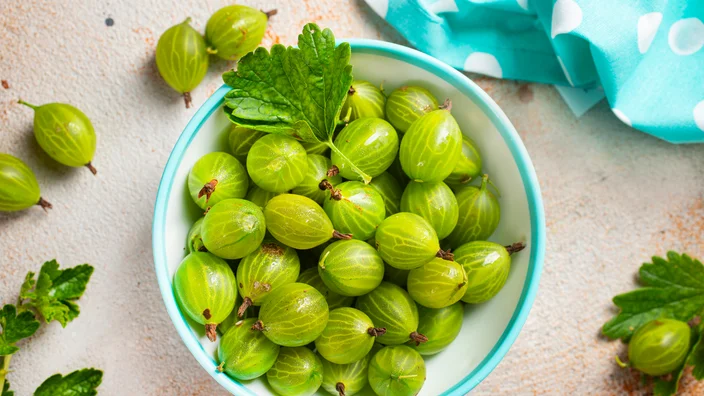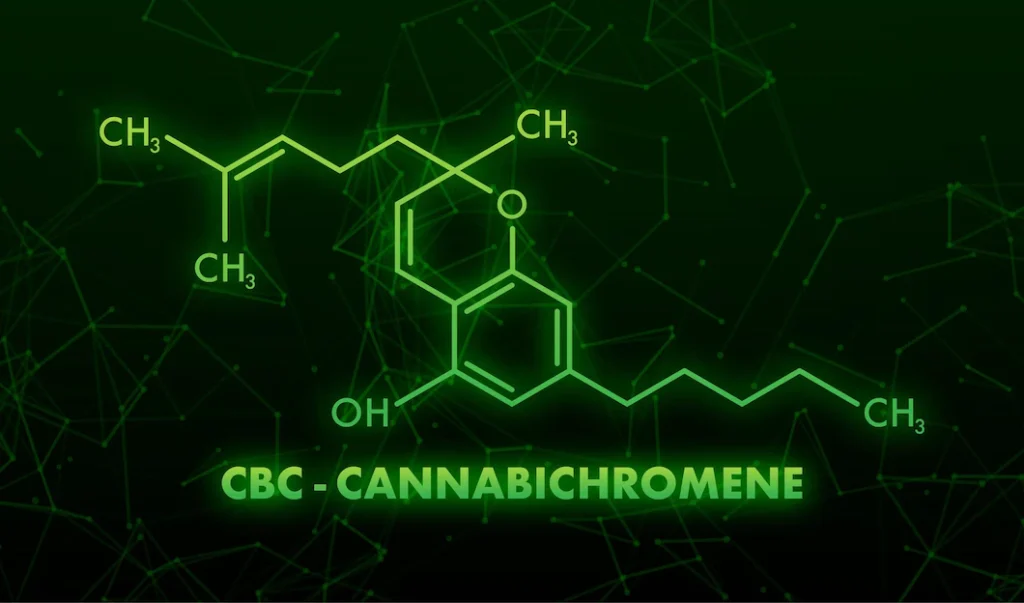
Probiotics – The Missing Link
October 7, 2020

This week our post is highlighting probiotics and our microbiome, what they are, and how probiotics help support our overall health and wellness.
What are probiotics?
Do you like yogurt? Or buttermilk pancakes? How about more exotic foods like kimchi, kombucha, or kefir? Who likes pickles or sauerkraut? These foods all have something in common. They are all fermented. Fermentation is the chemical breakdown of food carbohydrates by bacteria, yeasts, or other microorganisms into an alcohol or acid. The term fermentation is derived from the Latin fermentum for “boiling.” The name came from the observation of crushed grapes in large vessels that produced bubbles and appeared to be “boiling.”1We know now that fermenting grapes is the process for making wine. Humans have enjoyed fermented foods and drinks throughout history. The use of fermented milk and yogurt has been well documented. In fact, the earliest recordings of fermentation date back to as far as 6,000 BC and traditional fermented milk products, like kefir, were consumed as early as 7,000 BC.2 Kefir is a fermented milk drink originating in the Caucasus Mountain region and the name “kefir” is derived from the Turkish keyif meaning “feeling good after eating.”
The use of microbials originated (unintentionally) centuries ago when people first noted the beneficial health effects of eating fermented foods. Modern probiotic-containing foods and products are the direct derivatives of these early fermented foods.3 Check out some of the most common modern fermented foods containing probiotics:
- Bread (Sourdough)
- Milk (cultured milk, kefir, yogurt, sour cream, and raw dairy)
- Cheeses (cottage cheese, cream cheese, ricotta, aged cheddar, and gruyere)
- Vegetables (kimchi, sauerkraut, pickles, cabbage)
- Beer and wine, tea (kombucha), raw apple cider vinegar
- Soy (natto, tempeh, miso, soy sauce)
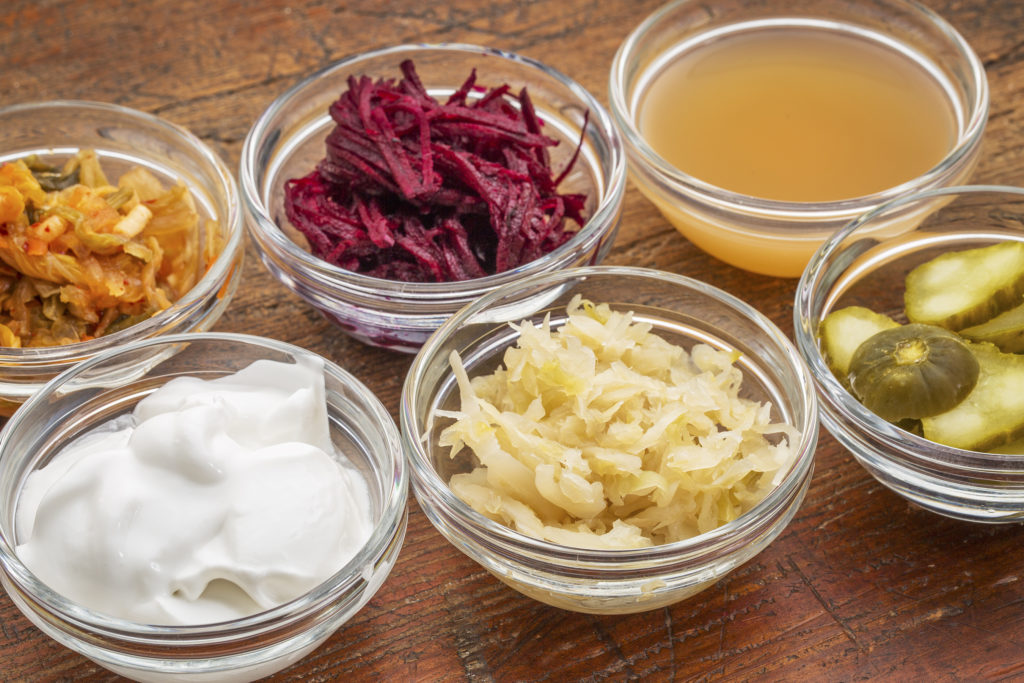
What does fermentation have to do with probiotics? So glad you asked! The World Health Organization defines probiotics as “live microorganisms which, when administered in adequate amounts, confer a health benefit on the host.”4 Probiotics are beneficial microbes—bacteria, yeasts, or fungus—that break down the carbohydrates in food. All of the foods mentioned above are left to ferment, allowing the microbes to break down the chemical structure of the original food, like grapes or milk , and turn it into an alcohol or acid, like wine or yogurt respectively. Civilizations all over the globe employ fermentation and enjoy the benefits of probiotics in their diets.
How do probiotics help?
There are many strains of probiotics in the foods we eat and dietary supplements we take. What science has discovered is that we actually need those different bacteria to maintain a healthy digestive system. Studies show that the balance or imbalance of bacteria in your digestive system, or microbiome, is linked to your overall health. Probiotics promote a healthy balance of gut bacteria and have been shown to offer a wide range of health benefits, such as the support of weight management*, digestive health*, and the support of a healthy immune system.*5 Research has also discovered a link between your gut health and your brain. This link between your central and enteric (lining of the gastrointestinal tract) nervous system AND the emotional and cognitive centers of the brain is a two-way communication system called the gut-brain axis (GBA). That means that your overall gut balance is linked to your overall emotional balance and affects other connected areas of your body, such as your immune system. Recent advances in research have described the importance of the friendly microbiota (the trillions of microorganisms within and on our bodies) as one of the key regulators of the gut-brain axis.
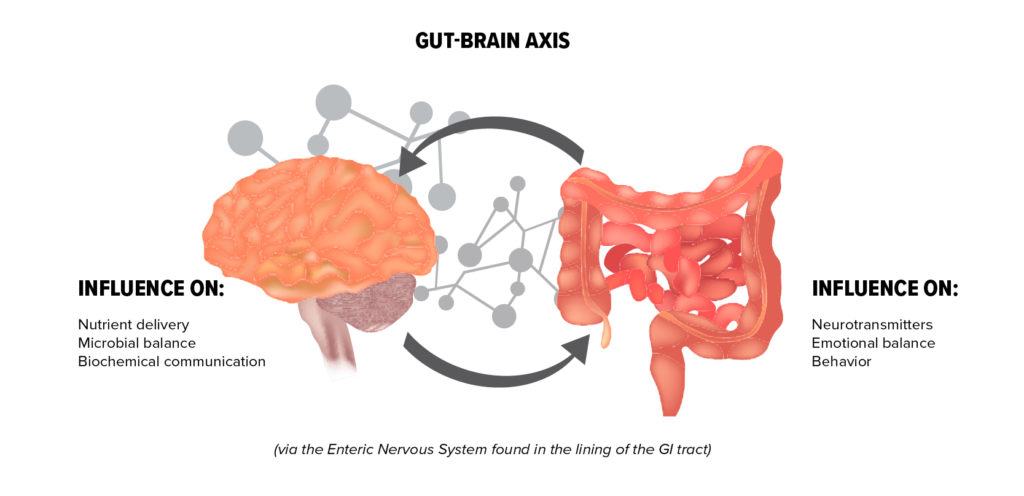
At birth, we have good native bacteria present in our gut, but as time goes on, dietary changes, stress, antibiotics, or other medications can decrease the presence of beneficial microflora.6 These factors contribute to an imbalance in our microbiome and in turn, our gut-brain axis. And, as with all things, the microbial diversity in the gut diminishes with age. Probiotic supplements can help return our microbiome to a balance state and support our gut-brain axis as well. So, what are these helpful bacteria? The two most recognized groups are Lactobacillus and Bifidobacterium. Lactobacillus are found primarily in the small intestine, while Bifidobacterium colonizes primarily in the large intestine. The most well-known of these include:
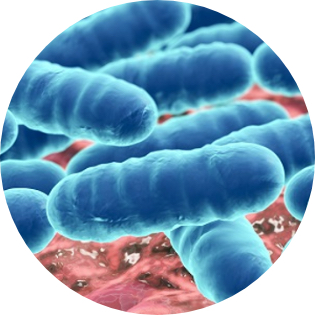
L. Acidophilus
- Arguably the most widely recognized probiotic, with a history of use that traces back to the 1920’s
- This species helps the body absorb nutrients *
- Supports in the digestion of dairy foods
- Supports the body’s immune system*
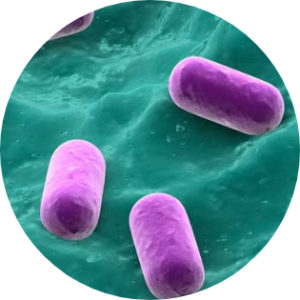
L. Plantarum
- Grows best at a temperature near body temperature and can survive the harsh journey of the GI tract
- Support digestion*
- Support a healthy immune system*
- Relieve occasional bloating and intestinal discomfort*
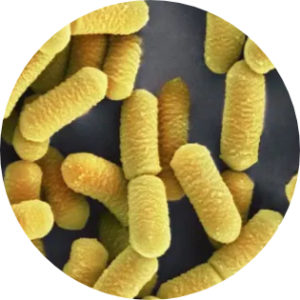
L. Rhamnosus
- Naturally found in your body as well as many dairy products
- Support digestive and immune health*
- Supports healthy weight management*
- Support women’s health*
Not only do our bodies rely on a balanced microbiome, they rely on feeding that microbiome as well. Of all the probiotic foods and beverages listed above, has any one of them ever tasted “so good” that you “could eat or drink them every day”? Have you ever had a craving for them? Our bodies may be telling us something. Not only do we need them, but we also need to replenish them by feeding them. Eating foods high in prebiotics helps promote the growth and proliferation of healthy bacteria in our microbiome. Prebiotics are considered a “functional food”; a type of fiber that the body can’t digest. They act as food for the friendly bacteria in your gut and provide numerous health benefits. Prebiotic foods include chicory root, oatmeal, onions, asparagus, bananas, apples, barley, Jerusalem artichoke, and wheat bran.
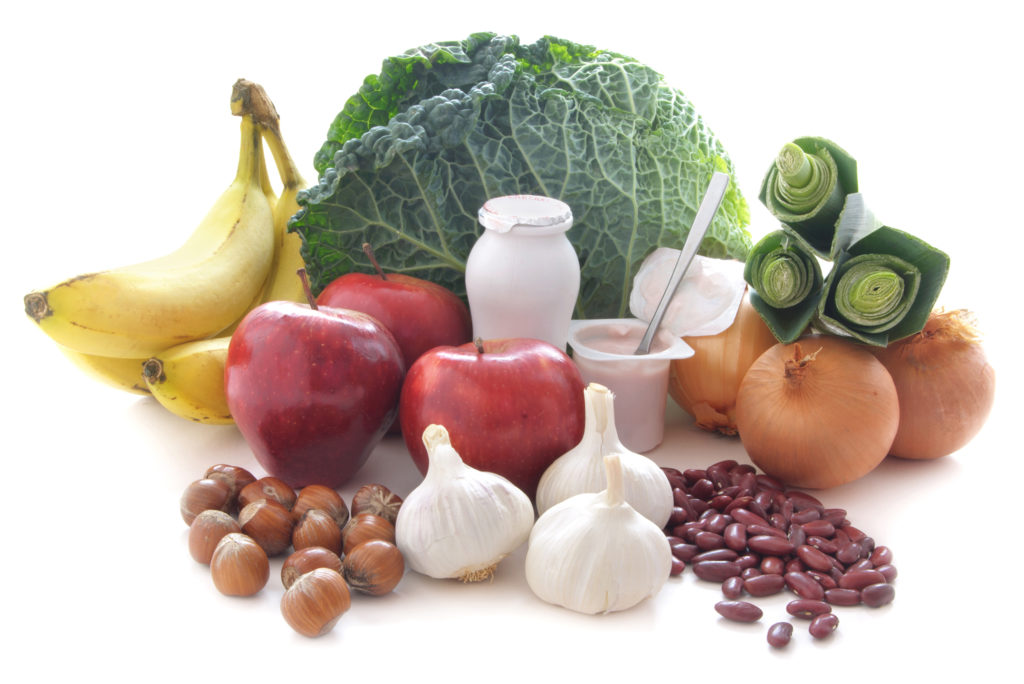
If we feed prebiotics to our good bacteria to maintain a healthy microbiome and functioning gut-brain axis, our overall health and wellness skyrockets. Taking in probiotic-rich foods or dietary supplements ensures that we stay balanced nutritionally and mentally.
Join us next week when we discuss all the benefits collagen offers both inside and outside our body.
1,2 Gogineni, V. K. (2013). Probiotics: History and Evolution. Journal of Ancient Diseases & Preventive Remedies, 01(02), 1-7. doi:10.4172/2329-8731.1000107
3 Gogineni, V. K. (2013). Probiotics: History and Evolution. Journal of Ancient Diseases & Preventive Remedies, 01(02), 1-7. doi:10.4172/2329-8731.1000107
4 Mack D. R. (2005). Probiotics-mixed messages. Canadian family physician Medecin de famille canadien, 51(11), 1455–1464.
5 Leyer GJ, Li S, Mubasher ME, Reifer C, Ouwehand AC. Probiotic effects on cold and influenza-like symptom incidence and duration in children. Pediatrics. 2009;124(2):e172-e179. doi:10.1542/peds.2008-2666
6 5 Key Benefits of Lactobacillus Plantarum [Web log post]. (2019). Retrieved September 17, 2020, from http://www.specialtyenzymes.com/blog/key-benefits-lactobacillus-plantarum
About Zilis’ Scientific Research & Development Department
Our Scientific Research and Development Department is headed up by Dr. Marielle Weintraub, a hemp industry expert. She holds a master’s and a PhD in Behavioral Neuroscience and is very active in many dietary supplement and hemp industry trade associations, including her role as the current President of the U.S. Hemp Authority. Dr. Weintraub is committed to the continued development of hemp-specific information and testing to fulfill the Zilis mission.
Science posts for Discover are co-researched and co-written by Kelly McGill, Senior Scientific Technical Writer at Zilis. Kelly holds a bachelor’s degree in English and a master’s in Linguistics / TESL. She has been writing science-related content for over 20 years and is an expert in making difficult concepts easy to understand.
Zilis is the creator of UltraCell™, a CBD oil product derived from hemp. Based in Argyle, Texas, a suburb of Dallas-Fort Worth, Zilis is privately held. Visit zilis.com for more information.
SHARE THIS POST
ABOUT THIS BLOG
Discover : The blog with the lifestyle, nutrition, science, and history of the hemp industry.
It’s your go-to for the most up-to-date information on hemp, CBD, dietary supplements, and more! Check it out!






